Authors: Rebecca Dahm (France, project coordinator), Katri Kuukka (Finland), Selin Öndül Talegon (Switzerland), Nermina Wikström (Sweden)
The project "A roadmap for schools to support the language(s) of schooling" is supported by the European Centre for Modern Languages (ECML, Council of Europe) and developed by a team of four experts. The Roadmap is aimed at primary and secondary schools that wish to help all their students to better succeed. However, the focus is primarily on the students who depend on the school to develop the language of schooling, i.e. the language usually used to teach the different school subjects. The lack or limited access to this language in a family context, for whatever reasons (the socio-economic context, newly arrived children, a family context of sign language, etc.), does not allow these students to access knowledge on the same basis as others.
During the year 2018, the project team developed an online self-assessment tool which is the first step of the Roadmap, in collaboration with a large number of experts. The year 2019 will see the finalization of the Roadmap with the setting up of a database of promising practices, gathered from the ECML projects and from the teacher practice from different countries in Europe. The schools using the Roadmap will thus receive a complete feedback on their strengths and levers of progress, including examples of promising practices so as to guide them further on the virtuous walk they’ve undertaken.
Essential definitions
The key concepts related to the Roadmap are the following: languages/s of schooling, linguistic dimension, academic language, and vulnerable students.
Language/s of schooling is the language used for the teaching the various school subjects as well as for the functioning of schools (Rec(2014)5, Committee of Ministers, Council of Europe, 2014). Beacco et al. (2016) also stress the need for ALL teachers to be aware of the linguistic dimension of their subject(s). Indeed, the goal of any subject is to help students acquire knowledge, but this cannot be done without helping them to grasp the meaning.
The language used in the teaching of school subjects is therefore an instrument that serves both to conceptualize the content and to express oneself in a rational and "academic" style according to the conventions and registers specific to each subject (Vollmer, 2006). The concept academic language is used to refer to the type of language needed to participate, understand and communicate successfully in cognitive demanding activities, adapted to age and context (Himmele & Himmele, 2009).
Finally, the concept of Vulnerable students is also central to our Roadmap: like Fleming (2009) specifies, it refers to all students who depend on the school to understand and learn the broad spectrum of cultural codes integrated into the formal use of language.
A digital roadmap for schools
We have built on these concepts to set up a "roadmap" which is a digital survey tool that supports schools in their reflection and in the implementation of a strategic plan that they themselves have determined. To achieve this, all the stakeholders in the school, head teachers, teachers, non-teaching staff, students and parents, are invited to complete, on an individual basis, a self-assessment tool adapted for each stakeholder, also acknowledging importance of the wider community.
Each stakeholder can determine his role which will lead him to a specific survey, adapted to his profile. The entry page of the survey looks as following:
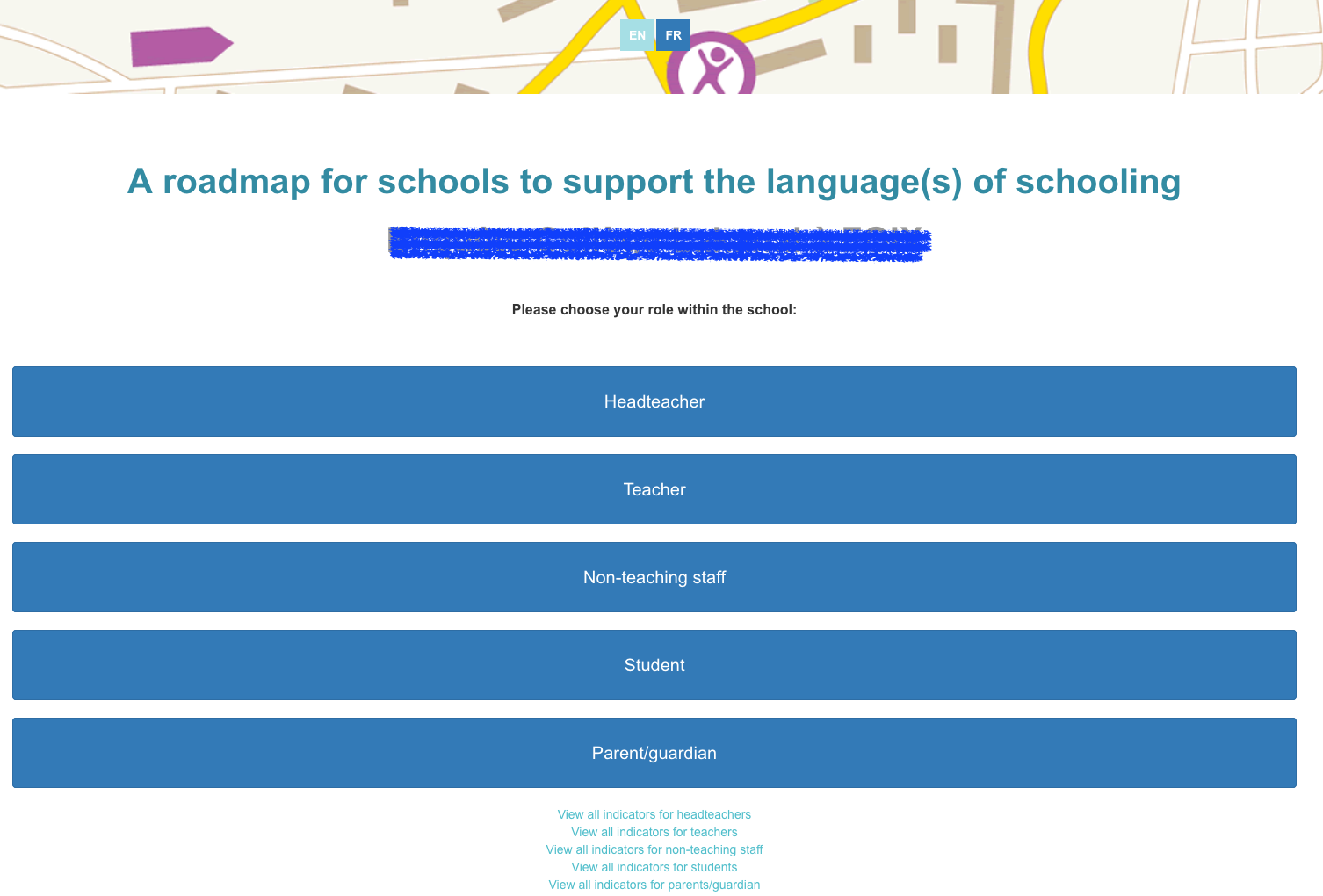
Screenshot 1: Entry into the survey for each of the stakeholders
Each stakeholder is led to reflect on nine thematic areas (divided into a number of statements). These areas invite the respondents to evaluate the way in which the school takes into account the linguistic dimension of the subjects, knows and uses the resources available and welcomes students and families in their diversity. For each sentence, the stakeholder chooses to position the school on a scale from 1 to 4 (or from red to green, with the possibility to neutralize the question), as can be seen below.
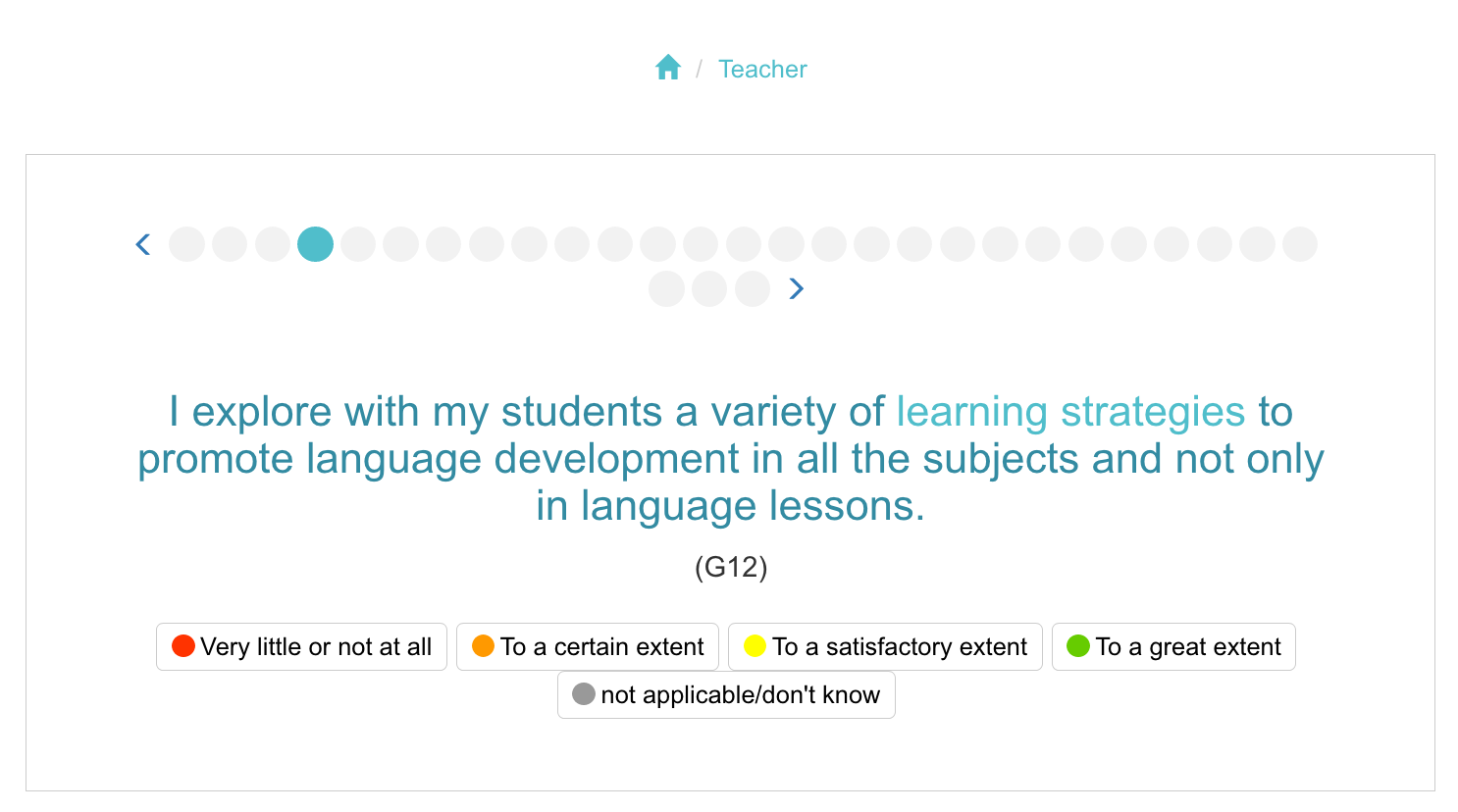
Screenshot 2: Simulated answer to one of the questions asked to a teacher
Once the stakeholder has completed the survey, it would be possible to print the results showing the individual responses, which would allow for a global view concerning the insights related to the thematic areas identified below (simulation of results).
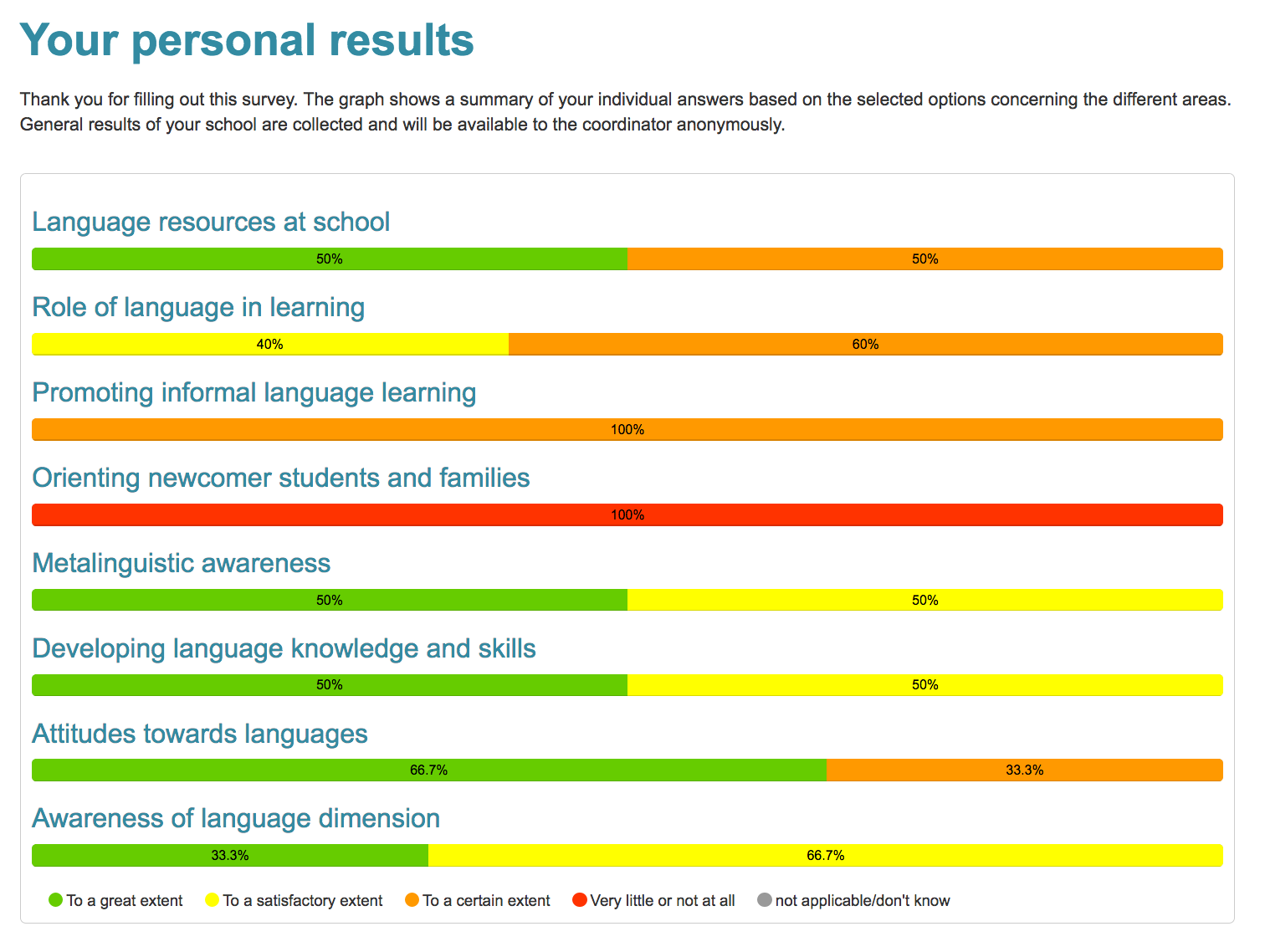
Screenshot 3: Simulation of a teacher's personal results
Schools then receive a report based on the responses from the various stakeholders, highlighting the strengths and levers for progress for the entire school. The results of all the stakeholders are positioned on each axis representing a thematic area, thus allowing to quickly visualize the strengths and levers of progress for the entire school (see screenshot 4 below).
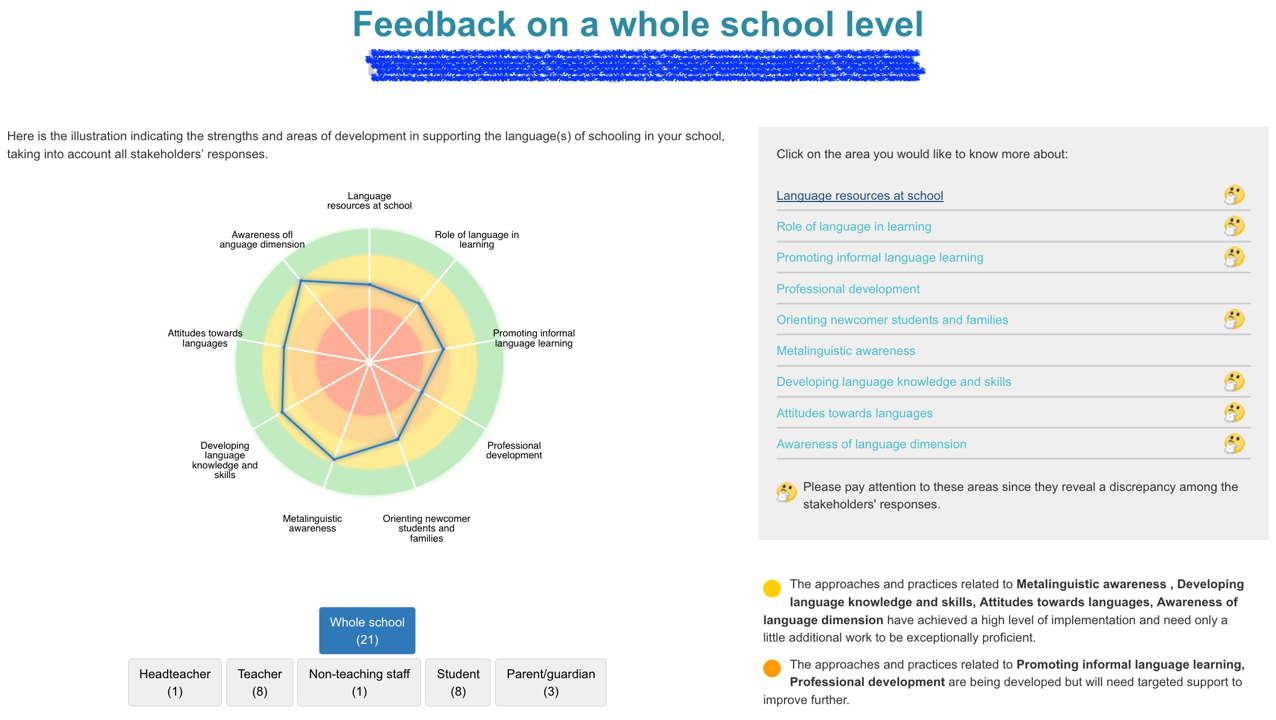
Screenshot 4: Feedback on a whole school level
The school’s attention is drawn to the thematic area(s) for which there is a significant discrepancy between the responses of the various stakeholders: even if the overall result may be positive, the fact that some stakeholders do not agree with the rest of the respondents deserves to be discussed and used as the starting points of the further development of these areas.
Each thematic area can also be analysed in depth, in order to understand the positions of the different stakeholders taken as a whole, the anonymity of the respondents to the questionnaire being absolutely guaranteed (see Screenshot 5 below, which is a detailed feedback related to the thematic area "Language resources at school").
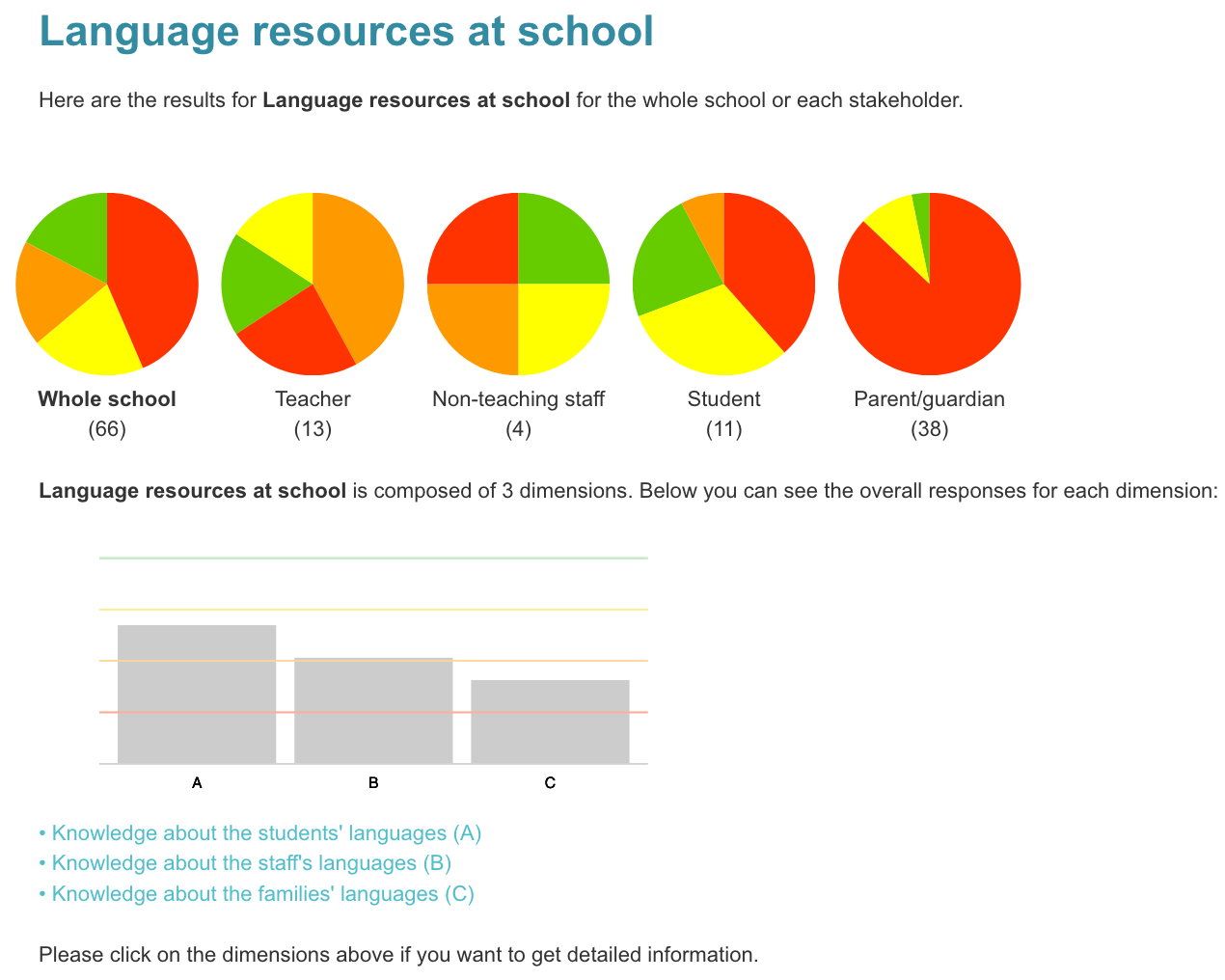
Screenshot 5: Detailed feedback related to the thematic area "Language resources at school"
Finally, inspiring ideas and promising practices will be suggested to promote the dialogue between all the stakeholders, which should facilitate the implementation of actions that meet everyone's expectations.
Prospects for the future
The workshop held in Graz on 15 and 16 November 2018 made it possible to make some further modifications to the tool, in order to improve its user-friendliness, modifications that will be taken into account in the new version under development. The experts have also produced a number of "promising practices" that will be included in the database to provide inspiring ideas. Indeed, the final step on which we will focus throughout 2019 is the development of this database which will make it possible to identify a large number of promising practices not only from current and previous ECML projects, but also highlighting a number of local initiatives or national and international projects.
References
Beacco, J.-C., Fleming, M., Goullier, F., Thürmann, E., & Vollmer, H. (2015). The linguistic dimensions in all school subjects: a handbook for curriculum development and teacher training. Strasbourg: Council of Europe. https://rm.coe.int/09000016806a55b9
Council of Europe (2014). Recommendation CM/Rec(2014)5 of the Committee of Ministers to member states on the importance of language skills for equity and quality in education and educational success (adopted by the Committee of Ministers on 2 April 2014 at the 1196th meeting of the Ministers' Deputies). https://search.coe.int/cm/Pages/result_details.aspx?ObjectID=09000016805c6105
Fleming, M. (2009). Languages of schooling and the right to plurilingual and intercultural education. In Intergovernmental Conference Report. Strasbourg: Council of Europe. https://rm.coe.int/16805a2350
Himmele, P., & Himmele, W. (2009). The language-rich classroom: A research-based framework for teaching English language learners. ASCD.
Vollmer, H. J. (2006). Languages across the curriculum. Preliminary study. Strasbourg: Council of Europe. https://rm.coe.int/CoERMPublicCommonSearchServices/DisplayDCTMContent?documentId=09000016805c7464